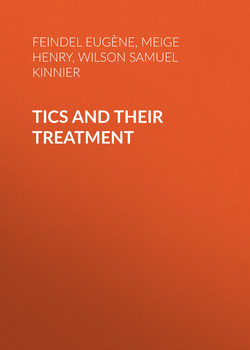Читать книгу Tics and Their Treatment - Feindel Eugène - Страница 2
AUTHORS' PREFACE
ОглавлениеOUR object in publishing these studies has been twofold: first, to make known various facts of clinical observation, which will always possess at the least an intrinsic value; secondly, to endeavour to assign to the tics their due place among the numerous motor affections consequent on nervous or mental disease. With this end in view we sought to free ourselves of preconceived notions, avoiding at the same time the other extreme of eclecticism. Independently we have been led to adhere to the doctrine hallowed by the authority of Charcot, and since advocated by Professor Brissaud – a doctrine that seems to us to be in harmony with accepted clinical data.
We have thought it advisable to indicate, by the way, more than one misconception whose perpetuation is but a stumbling-block in the path of progress.
Since the eighteenth century the word tic has faced the perils of definition many a time, and has as often all but succumbed. The limits of its application have been alternately enlarged and narrowed to an excessive degree; its original signification has been so obscured that the inclination to-day is either to hesitate in the use of the word at all, or to employ it indiscriminately through ignorance of its real meaning. But if its interpretation be not specified, everything that is said or written on the subject will remain fatally open to dispute. Want of precision in words leads inevitably to confusion of ideas and endless misunderstanding. In this respect the word tic is a great culprit; its promiscuous use implies looseness in its connotation – a fruitful source of controversies which, when all is said and done, are nothing more than regrettable quid pro quos. On fundamental points there is almost complete unanimity of opinion; any divergence is purely superficial, and to be ascribed to disagreement in terms.
Hence it has seemed to us essential to adopt a vocabulary, and to employ any term only after clearly particularising the sense we attribute to it. Our verbal conventions will not meet with universal acceptance, it may be, but we shall be the first to abandon them if common consent assign to the expressions that replace them the exact shade of meaning we meant to convey.
Our work will not be superfluous if we succeed in allotting to the word a definite position in medical terminology, or if any information we have amassed prove of service to future observers. And should we be enabled to demonstrate how unmerited is the reputation the tics enjoy of being irremediable, how they may, on the contrary, be mitigated and sometimes even cured under appropriate treatment, the practical value of the conclusion will, we hope, justify the importance we have attached to the subject.
